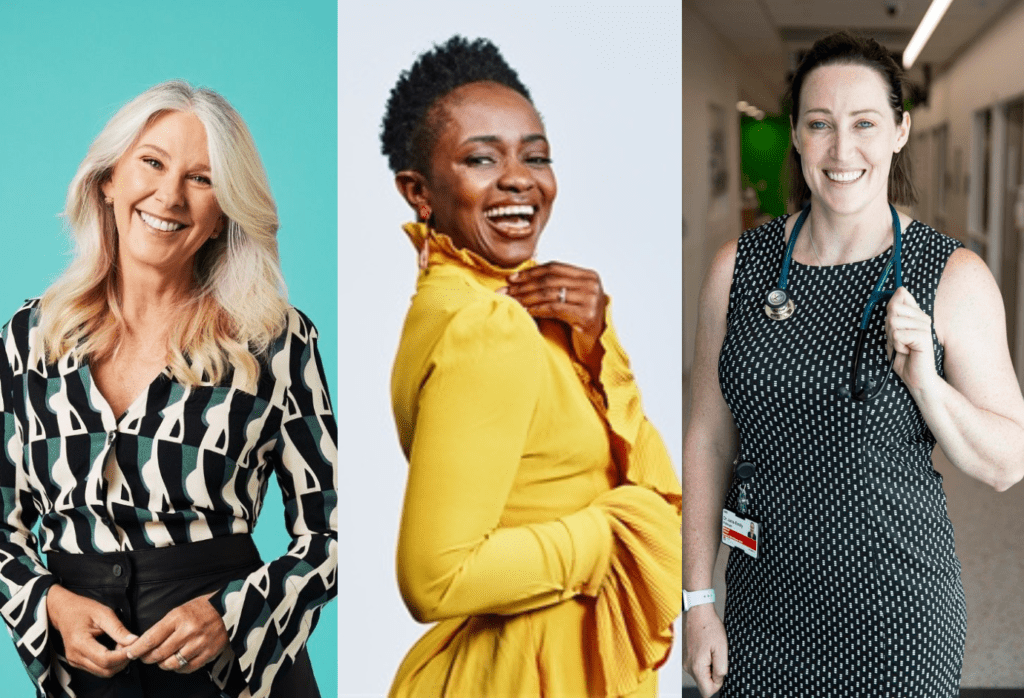Each year, The Remarkable Woman, founded by Shivani Gopal, hosts a spectacular event with a line-up of diverse, inspirational speakers all with gender equality on their mind.
This morning, we heard from former newsreader Tracey Spicer, founder and CEO of the Aminata Maternal Foundation, Aminata Conteh-Biger and former Olympic champion hurdler and bobsleigher Jana Pittman.
Gopal kicked off the breakfast event by drawing attention to the reason for the gathering — to mark and celebrate International Women’s Day 2022. But Gopal also noted the tragic backdrop of this year’s event.
“We are here to celebrate, but also, how can we celebrate when our homes are flooding, when, across the other part of the world there’s a ruthless war being waged?” she asked. “And the pandemic… And yet here we are, we endure. We gather here collectively to break the bias,” she added, referring to this year’s offical slogan for IWD.
Gopal mentioned Olena Zelenska, Ukraine’s First Lady, calling her the “female face of resistance”, Grace Tame and Brittany Higgins for their advocacy and Katalin Karikó for her work in developing the COVID-19 vaccine.
Tracey Spicer took to the stage to talk about her upbringing, detailing the first instance of workplace sexism she experienced, and how she managed to overcome it. She told the audience about taking her employer, Network Ten, to court, to challenge an unfair dismissal.
“If there’s anything I want to leave you with, it is that self care is most important,” she said.
Spicer’s talk was followed by a powerful speech from war survivor Aminata Conteh-Biger, who gave a riveting outline of how she overcame abuse to start a new life in Australia.
The charity founder, and last year’s winner of Agenda Setter of the Year Award, who penned her story in an extraordinary book, “Rising Heart: One Woman’s Astonishing Journey from Unimaginable Trauma to Becoming a Power for Good” in 2020, told audiences about the way she overcame trauma and tragedy in her birth-country of Sierra Leone to start a charity, Aminata Maternal Foundation, decades later.
“During the war in Sierra Leone, I was stripped of my dignity,” she said. “I had to get a strength I never thought was possible.”
The Sydney-based charity director was 19 when she arrived in Australia, where she was asked to start at Year 9 in high school. She said the bias she experienced was most evident once she began her charity.
“Diversity means difference, it just means different,” she said. “Diversity is just who we are, it’s not a trend. I didn’t know I was black until I was in Australia.”
“Bias is my everyday life as a woman of colour, as a woman on my own board.”
Conteh-Biger shared an experience of being ignored by a white woman on the board when she was trying to set up her foundation.
“I had to sit in a place of grace,” she said. “For years I had to be in the shadow of a white woman. Women of colour are at the most disadvantage, we have less opportunity.”
“If you chose to face your bias, if you want to help, then know the difference between what’s given to white people compared to a black person.”
Ultimately, Conteh-Biger said she wants to restore humanity with dignity. “Would any of us be here today if motherhood marked an end, not a beginning?” she asked.
It was with this that Olympian, Jana Pittman began her address with a warning to the crowd:
“My water might break, so just, be prepared,” the former world-champion athlete said — she is due with twins in a few weeks’ time. “My career has been one of privilege,” she said. “I’m a mother to four and about to give birth to twins. I haven’t had a lot of bias in my life,” she said.
“I haven’t experienced much bias in my life, I’ve seen setbacks as fodder for success. I spoke to my mother and we decided that we have chosen to see bias, not as a bad thing.”
But the deeper she delved into her past, the more clarity she saw around what had happened to her.
“The minute I was pregnant my contracts were stripped form me,” Pittman admitted. “You couldn’t be a woman in sport and bring up a family.”
Pittman, who turned to bobsledding after her stellar career as a hurdles champion, decided to train as a doctor in her late twenties, and is now specialising in women’s health — calling medicine ‘the greatest thing’ she has ever done in her life.
She called herself a ‘career chameleon’ and encouraged the audience to use her strategies.
“I try and push away everyone else’s opinions. You can have everything with the right frame of mind and the right attitude,” she said. “You can either be angry or be the leader of change with companies. It’s a choice – how you react to something.”
“You can have it all, if you drop the little shit. Simplify, simplify, simplify. My weaknesses are my strength. You need to change this perception.”
“I realised that I was less successful when I wasn’t true to who I am. I was emotional, I’ve always been emotional. Make sure you find your thing that makes you feel better.”
“My emotion is my secret weapon. Sit at home and think about the worst thing about you and it might be the best thing about you.”
Finally, Pittman advised audiences to try a practical strategy for eradicating negative self-talk.
“Tie an elastic band around your wrist. Every time you have a negative thought about yourself, snap it. Reinforce it with something positive.”
“Be the change you want to see,” she concluded. “No matter what it is. It’s up to us to decide what feedback we want to hear.”


